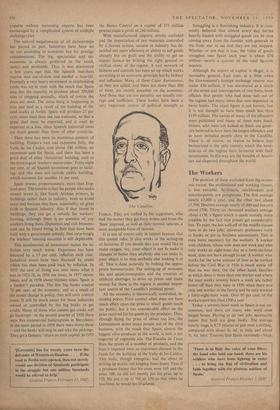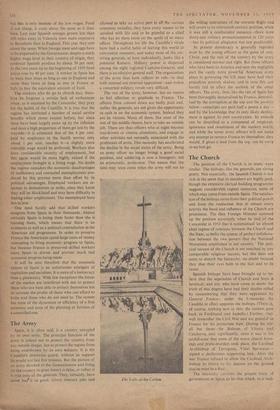The Workers
The position of those excluded from the econo- mic racket, the professional and working classes, less enviable. Architects, stockbrokers and notaries-public are prosperous. The first average nearly £3,000 a year, and the other two about £1,500. Doctors average nearly £1,000 and lawyers about £700. Thirty-six thousand teachers average about £150, a figure which is made scarcely more credible by the fact that priests get considerably less. To exist, the less well-off of the middle classes have to do two jobs; university professors work in banks or act as business accountants. This is even more necessary for the workers. A worker with children, whose wife does not work and who only works an eight-hour day or a forty-six-hour week, does not have enough to eat. A worker who works for the same amount of time as he worked before the Civil War in 1936 is much worse off than he was then. On the other hand, families in which there is more than one worker and where the man works seventy hours a week are rather better off than they were in 1936 when there was only one worker in The family and he only worked a forty-eight-hour week–Over 95 per cent, of the workers earn less than £300 a year.
Today a seventy-hour week in Spain is not un- common, and there are many who work even longer hours. Having, to do two jobs necessarily means that both are done badly. The average hourly wage is 8.75 pesetas or just over a shilling, compared with about 4s. 6d. in Italy and about 5s. 6d. here. Tourists find Spain extremely cheap, 'There is in Italy the voice of your Duce, the hand who held our hand; there are his soldiers who have been fighting in order . . . to bring the flag of civilisation and faith together with the glorious soldiers of Spain.'
General Franco, Ocibber 2. 1937.
but this is only because of the low wages. Food is not cheap; it costs about the same as it does here. Last year Spanish oranges 'grown less than 200 miles away in Valencia were more expensive in Barcelona than in England. This year they cost about the same. When foreign meat and eggs have to be imported by the Government, despite a much higher wage level in their country of origin, they undercut Spanish produce by about 30 per cent. In the two years up to the beginning of 1959 food prices rose by 40 per cent. A worker in Spain has to work four times as long as one in England and more than twice as long as one in France or Italy to buy the equivalent amount of food.
The workers who do go to church may there- fore be forgiven a certain lack of enthusiasm When, as is enjoined by the Concordat, they pray for the health of the Caudillo. It is true that the regime has instituted a number of social service benefits which never existed before, but since these have been largely eaten up by the inflation and since a high proportion of them get lost by the wayside—it is estimated that of the 4 per cent. paid by employers to the health service only about per cent, reaches it—a slightly more tolerable wage would be preferred. Workers also have considerable security of employment, but this again would be more highly valued if the employment brought in a living wage. No doubt the regime considers the economic disadvantages of inefficiency and concealed unemployment pro- duced by this proviso more than offset by its political advantages. Employed workers are re- luctant to demonstrate or strike, since they know they will be blacklisted and may have difficulty in finding other employment. The unemployed have less to lose.
One need hardly add that skilled workers emigrate from Spain in their thousands. Almost certainly Spain is losing them faster than she is training them, which means that there is an economic as well as a political contradiction in the American aid programme. In order to preserve Franco the Americans spend large sums of money attempting to bring economic progress to Spain, but because Franco is 'preserved skilled workers leave Spain in droves and prevent much real economic progress being made.
It will be seen therefore that the economic system of Spain is an unfortunate amalgam of capitalism and socialism, It is more of a lootocracy than a plutocracy. With few exceptions the forces of the market are interfered with not to protect those who are least able to protect themselves but to increase the profits of those who can afford to bribe and those who do not need to. The system has none of the dynamism or efficiency of a free economy and none of the planning or fairness of a controlled one.











































 Previous page
Previous page